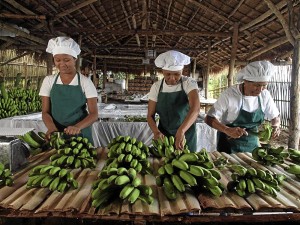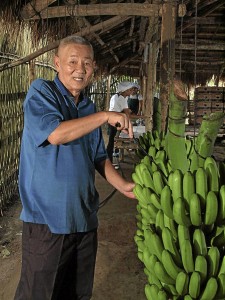At 73, he remains hands-on in his banana plantation
Some four decades ago, Patricio Amadeo drove a jeepney for a living in his hometown in Iloilo City. While he feels it was an “honest and noble job,” an experience he himself is proud of, his hand-to-mouth way of life was difficult for his family.
“Maybe there is more to this,” he remembers telling himself.
Armed with guts, big dreams and faith, he set out down south to the sleepy town of General Santos (formerly Dadiangas) in Mindanao to carve a different life, to plant a different future.
The 45-minute uphill trek was dusty and bumpy but the sight was something to behold.
Rows of pineapples neatly planted, cluster of mango trees and corn line the dirt road. Mob of sheep graze on verdant grass together with calves as birds swiftly fly.
Upon reaching higher ground, cool, gentle breeze sweeps the land. This is where Amadeo goes to every day to manage his business, Phela Resources Inc.
At 73, Manong Pat—as he is fondly called by workers of his vast banana plantation—still personally oversees his business.
“He is very hands-on,” says his general manager Elmer Delima. Going up the mountain regularly to inspect production, he goes from one makeshift shed to another and makes sure everything—from harvest, priming and packing of the bananas—is met with tight quality control. “He has a very good memory and tends to remember the tiniest of details,” Delima shares.
Couple this with Amadeo’s uncanny ability to turn everything into opportunities, it is no wonder Phela Resources, and a slew of his other businesses, continue to thrive despite the ever changing economic terrain.
Driver to entrepreneur
His decision to leave his hometown was based on a multinational company—not that he worked there. At that time, Coca-Cola was opening a plant in Dadiangas and his entrepreneurial mind-set kicked in.
He thought, “If a big company was confident of setting up a firm in the town, that must be a good sign of economic boom in the area.”
With a meager P10, Amadeo set up business making school bags and selling them in the public market. “Madali lang gumawa ng bags” (Bags are easy to make), he narrates. Business was brisk and after gaining capital, he ventured into several more enterprises—going into aqua- and agri-culture as well as in the hotel, furniture and retail (hardware) business.
Having recently brought land in the uphill of General Santos City, he first thought of planting Jumilina trees, its hard wood would provide raw materials for his furniture business.
Although admittedly profitable, the trees took years to mature and the onslaught of El Niño throughout the country took a toll on the business. Not to be shaken, Amadeo thought of planting ‘early crops’—fast maturing plants that will bear fruits within a year—.in his land.
Although the hilly terrain doesn’t guarantee profit, he took the chance and planted banana. After all, he thought, “bananas planted on higher ground yield sweeter fruits.”
The steep slopes and uneven plateaus of the mountain proved to be tricky—he needed a variety with a sturdy trunk, one that could hold the weight of its fruits. The Lakatan and Señorita, the local varieties resistant to pests, proved to be the best choices. The first few harvests were sold mostly in the public markets of GenSan, Cebu, Iloilo and Manila. Although one without a background in banana growing, Amadeo muses, “God must really love me,” as business continues to flourish and do well locally.
At about the same time, pest contamination in bananas was a big concern, especially for exporters.
DOLE, the world’s largest producer and marketer of high-quality fresh fruits, stumbled upon Amadeo’s produce and took interest, asked for several samples of the fruit and after
passing the stringent set of qualifications made them their sole supplier of Lakatan and Señorita varieties for export to Japan.
“The export to Japan,” he muses, ”increased with the popularity of the banana diet.”
With a thriving business, he continued to purchase additional land, and invest more in capital. “We opted to bank with Plantersbank,” he shares.
When other banks turned them down for loans, Plantersbank was ready to help. “They’re easy to talk to,” he says.
Manong Pat, the visionary
When he started Phela Resources, he tapped the indigenous people to be his workers. “Here in the mountain, there are no employment opportunities,” he laments.
“They cannot write, and they can only speak in Bisaya,” says Amadeo, thus greatly limiting their chances of decent work.
But knowing the hilly terrain like the back of their hands, the indigenous people know how to grow and best take care of the banana plant and its fruits. “They are my greatest asset,” he says.
Not only does the company provide jobs to some 600 workmen and women, it has transformed Sitio Pao-pao, a once humdrum countryside setting to a thriving community with roads well built and schools from elementary to high school. “I want to give the people here in the mountains a good chance in life,” he smiles.
With job opportunities and a sound educational system in place for the children of his workforce, “I am more than a mayor,” he shares with the chuckle.
Up the rugged mountain terrain, thousands of hectares are peppered with the Banana plant. With hardwork, faith, strokes of good luck and determination, Manong Pat has brought Phela Resources Inc. to higher grounds.
More than achieving success in business though, he has planted the seeds of hope for the people who work for him; he is more than a business owner, he is a visionary.


